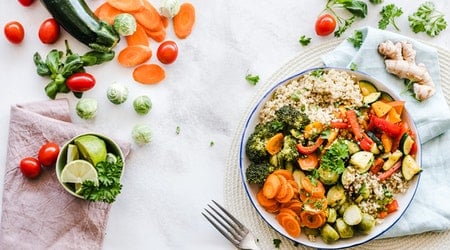
What you eat directly affects your baby. So it is important to eat well during pregnancy. This will give your baby the nutrients they need to grow and be healthy. While there isn’t a magic formula for perfect pregnancy nutrition, including key foods with beneficial nutrients will nourish both you and your baby throughout this important time in both of your lives.
Fiber is crucial for proper digestion throughout pregnancy. Constipation is a common pregnancy symptom, and fiber is one of the best defenses against it. Fiber is also necessary to keep the beneficial bacteria that live within your gut healthy, which is important during pregnancy.
Fiber is an essential nutrient both during and after pregnancy. The dietary reference intake for non-pregnant women is 28 grams of fiber daily, so experts recommend pregnant women aim to consume 30 grams or more each day. It’s best to increase your fiber intake slowly over time, as too much fiber too quickly may trigger unwanted effects, including bloating, gas, diarrhea, and/or constipation.
Fruits, vegetables, whole grains, beans, legumes, nuts, and seeds all are high fiber foods for pregnancy. Incorporating various foods into your routine will benefit both you and your baby!
Fruit
Fruit provides your body with fiber and many other beneficial nutrients, including vitamins, minerals, and water. The skin on fruit, including apples and pears, contains a large amount of fiber, so be sure to eat the skin! Fiber content varies from fruit to fruit, but here are some examples of high-fiber fruits:
- Raspberries contain 8 grams per cup
- Blackberries contain 8 grams per cup
- Pears contain 6 grams per fruit
- Kiwis contain 5 grams per cup
- Grapefruits contain 5 grams per fruit
- Apples contain 5 grams per fruit
- Avocados contain 5 grams per cup
- Oranges contain 4 grams per fruit
- Blueberries contain 4 grams per cup
- Bananas contain 3 grams per fruit
- Strawberries contain 3 grams per cup
Vegetables

Vegetables also contain fiber, vitamins, minerals, and water. The fiber content of vegetables also varies, and examples include:
- Brussels sprouts contain 6 grams per cup
- Sweet potatoes (with skin) contain 6 grams per cup
- Broccoli contains 5 grams per cup
- Cauliflower contains 5 grams per cup
- Carrots contain 5 grams per cup
- Kale contains 5 grams per cup
- Spinach contains 4 grams per cup
- Cabbage contains 4 grams per cup
- Green beans contain 4 grams per cup
- Corn contains 4 grams per cup
- Potatoes (with skin) contain 4 grams per cup
Note that all measurements above are in cups of cooked vegetables.
Whole Grains
Whole grains provide your body with a lot of nutrients your baby needs, including iron, B vitamins, folate, and fiber. Whenever possible, choose whole grain products. Whole grain foods contain whole wheat bread and pasta, brown rice, and quinoa to fit in more fiber. Examples of high-fiber whole grains include:
- High fiber cereals contain up to 14 grams per ½ cup
- Quinoa contains 5 grams per cup of cooked
- Whole wheat pasta contains 5 grams per cup of cooked
- Brown rice contains 4 grams per cup of cooked
- Wild rice contains 3 grams per cup of cooked
- Whole wheat bread contains 3 grams per slice
- Popcorn contains 2 grams per cup popped
Beans and Legumes
Beans and legumes contain fiber and protein, calcium, folate, and iron, which all support your baby’s growth and development. They are also great alternatives to meat if you find yourself experiencing meat aversions, which are common during pregnancy. High-fiber choices include:
- Lentils contain 8 grams per ½ cup
- Pinto beans contain 8 grams per ½ cup
- Black beans contain 8 grams per ½ cup
- Chickpeas contain 6 grams per ½ cup
- Kidney beans contain 6 grams per ½ cup
- White beans contain 6 grams per ½ cup
- Edamame contains 4 grams per ½ cup
Nuts and Seeds
Nuts and seeds contain healthy fats, calcium, folate, and fiber. Including various foods will provide your body and your baby with a wide variety of vitamins and minerals you both need. Examples include:
- Pumpkin seeds contain 5 grams per ounce
- Chia seeds contain 4 grams per tablespoon
- Almonds contain 4 grams per ounce
- Sunflower seeds contain 3 grams per ounce
- Pistachios contain 3 grams per ounce
- Flax seeds contain 3 grams per tablespoon
- Walnuts contain 2 grams per ounce
Your Pregnancy
Fiber is a key piece of an optimal pregnancy diet. However, it’s important to note that every pregnancy is different. While sticking to these fiber recommendations is ideal, pregnancy poses challenges, including nausea, food aversions, appetite changes, bloating, etc. These symptoms may make some of the foods you know are healthy unrealistic for you at certain points in your pregnancy. You should listen to your body during pregnancy to have a healthy pregnancy. If you don’t like any of these foods, don’t worry. Talk to your doctor or dietitian about how to get the food and nutrients you and your baby need!
References:
Also read: